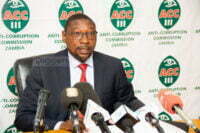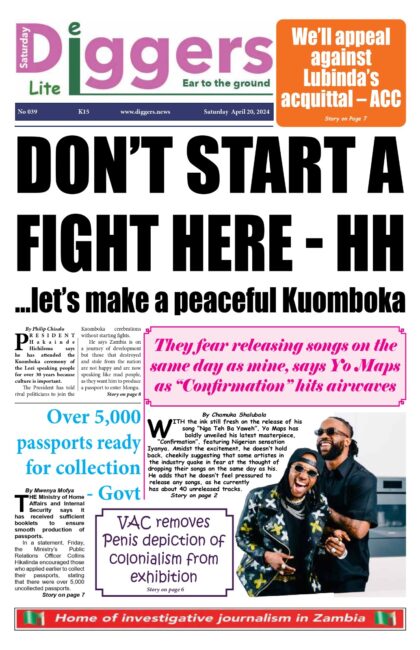Finance Minister Margaret Mwanakatwe says the Lusaka-Ndola dual carriageway, widely-reported to cost US $1.2 billion, is not a true figure.
And Mwanakatwe blasted some commercial banks in the country in the habit of offering expensive loans with high interest rates, despite the Bank of Zambia’s move to lower the Statutory Reserve Ratio (SRR) to five per cent and maintaining the Monetary Policy Rate (MPR) at 9.75 per cent.
Meanwhile, the Minister pleaded with South Africa to remove their non-tariff barriers.
Speaking during the Zambia-South Africa Business Council Meeting, Wednesday, Mwanakatwe disputed the Lusaka-Ndola dual carriageway as costing US $1.2 billion, after indicating that government intended to revise the Public and Private Partnership Act in Parliament to make it more response to the country’s developmental needs.
“…And if I want cassava to grow in Luapula, in large quantities, which can then be turned into starch for the mining sector to use and stop importing the huge quantities of starch that I do, I need to invest in rural Zambia. Rural Zambia needs roads. And as such, we need the private sector and we need locals to be part of that large medium small-scale infrastructure going forward. Our roads are being battered because of transportation of copper and as such we need rail. How do we ensure that TAZARA, the rail line, doesn’t take 21 days to get to the border? The private sector doesn’t not have 21 days. That is why you see us taking to Parliament the revised PPP (Public and Private Partnership) Act that we have. The Lusaka-Ndola dual carriage way is a PPP project that is being dubbed at US $1.2 billion. I think that is not a true figure, I think a true figure is going to be arrived at and this is what we want to see more,” Mwanakatwe revealed at Southern Sun Hotel in Lusaka.
And Mwanakatwe blasted some banks still offering loans above 24 per cent interest rates when the Bank of Zambia (BoZ) had reduced the Statutory Reserve Ratio (SRR) to five per cent and maintained the Monetary Policy Rate (MPR) at 9.75 per cent.
“So, bold reforms are extremely important if you are going to attract the private sector to come into your country. When we passed the Private Public Finance Management Bill, the country was shocked, what are we saying there? We are saying that, let’s use public finances prudently. So, this Act is now saying, ‘you minister, you can be jailed for abusing public resources.’ I am talking about bold reforms and that’s what this government has done. And this is where I would like to encourage our local banks to throw away the box and think outside the box. Conventional banking is going! These projects are long-term. Some of them are 20 years. Stop thinking short-term; local banks and just lending for trading purposes,” Mwanakatwe complained.
“And you have got to partner with some [of] these development funds that are there to reduce the costs of financing because you can’t lend at 24 per cent and expect these projects to work. Government has done its part; I know that the reserve requirement (SRR) has come to five percent. I know we are in the market looking for money, but that can’t be an excuse as to why you barely lending money at 25 per cent! I was reading the advert only the other day, and this bank, I don’t want to name and shame here, this bank was advertising, ‘come and borrow,’ that, ‘cheapest rates at 25 per cent.’ It can’t work! Zambia should not [be] borrowing because we are [capable of] creating this wealth that is sitting in all areas. Whether its minerals, agriculture.”
She added that Zambia is going through an internal “soul search” of how it is going to continue to invest in a sustainable manner, and pleaded with South Africa to remove tariff barriers and open up their trade to products manufactured in Zambia.
”So, South Africa, when you have got 70 per cent SADC trade, and between Zim (Zimbabwe) and Zambia, you have got four per cent, you can’t continue. You have got to come here, bring you money and help us to do value-addition. I remember when we were trying to take honey to South Africa much earlier; His Excellency knows how we struggled to get our honey into South Africa. And I was told at the time that your honey has got too much fractal, I had to look up the word, but it means sugar. And I went to the Zambia Bureau of Standards and said please test this honey for fractal and test the South African honey, there was more fractal in the South African honey than in my honey! What am I getting at? The non-tariff barriers from South Africa have to be removed. You have got to open up for what we produce, and we produce some excellent stuff! And when you put your money into some infrastructure, we can actually move this product much more easily, more efficiently into your market. We want to enter your market. Trade Kings has got one of the best products on the continent. Trade Kings went to set up in South Africa, they were charged some exorbitant amount, but their products up to today cannot enter Shoprite, or any big super market in South Africa. So, they had to set up in some area where there is some huge Indian community and their product is selling beautifully there. Come on, South Africa wake up! We are getting into a continental free trade area. Very soon, you won’t be able to hide much longer. We need you to open up because we have opened up,” pleaded Mwanakatwe.
“You have come at a time when Zambia is going through an internal soul search of how it is going to continue to invest in a sustainable manner; how it’s going to manage its debt going forward in a sustainable manner, and how it’s going to continue to build the infrastructure that it is building. We have done a lot. We have put money into roads, we have borrowed; we have put so much money into schools, into hospitals, health posts. We need more, and we as a government cannot do it on our own. That’s why this is actually opportune that you have come here to talk about investment into infrastructure, in all areas of infrastructure. And when we took a decision as Cabinet to actually stop borrowing any further for a good two year moratorium, it was because we realise that continuing to borrow is unsustainable. How do we ensure that social infrastructure is still very much being invested in over the coming years because we cannot stop. We can’t have a GPD [Gross Domestic Product] of 4.1 per cent and expect to cater for the social infrastructure and the social needs of Zambia. We need to get back to 7 per cent GDP, we need to get to 10 per cent GDP because [with] this, [we] will then begin to see less and less inequality that is happening right now.”
Meanwhile, Mwanakatwe later told News Diggers! in an interview that government would not abandon projects that were below 80 per cent completion.
Responding to concerns that have mounted from a broad spectrum of stakeholders following President Edgar Lungu’s announced austerity measures last Thursday that, halting funding to projects below the 80 per cent completion threshold would eventually cost government more, Mwanakatwe soothed those concerns.
“The priority is that we will ensure that projects that above 80 per cent are completed. When we say those that are above 80 per cent, that’s not to say we are abandoning the rest because we have signed contracts. So, you have to complete the projects whose contracts have been signed and financing has already been contracted. So, those will continue, but the priority is going to be those that are 80 per cent complete so that we finish them. And we know exactly where they are, Ministry by Ministry, and we would like to complete those. And then we will continue because investment doesn’t stop, it’s how you package your debt that’s what is important. So, we are going to find other ways of funding these projects that are less costly and longer in terms of turnout. The thing is that, with IMF, you never stop engaging because we are a member of the IMF; we are part of the family. So, their normal visits which they do in September will happen. It was important for us to do a deep dive into the debt and analyse what debt we have and we confirmed the figures. That we have done so then one can go to the table and talk comfortably that the debt is what it is. When you look at the [external] debt US $9.3 billion as of March 31, the quantum of it is not for a country like Zambia; it’s not actually a very big figure, if we grow our revenues, if we grow our GDP,” said Mwanakatwe.
“Because if you have revenue there, your debt there, and your revenue is here, if you expand it, your debt in relation to that revenue becomes a lot more manageable, a lot more sustainable. So, that’s what we are doing, we are looking at everything that we have contracted. So, of the things that we contracted three years ago, maybe now you don’t need them. Maybe your priorities have changed, so you cancel them, somebody says, ‘maybe we don’t need a clinic here, maybe we need a health post or a hospital,’ all those infrastructure things, we have reviewed, and the ministers have come on board and looked at their portfolios.”












